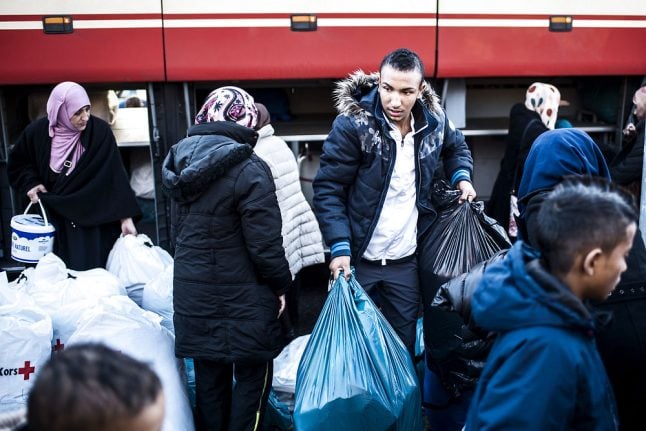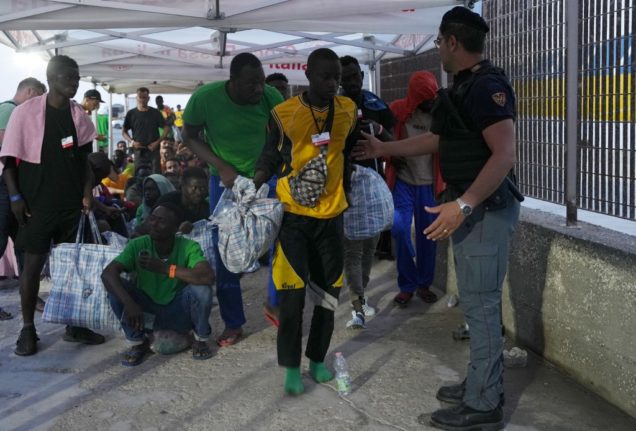The legislation allows police to confiscate cash and valuables above 10,000 kroner from arriving migrants and asylum seekers.
Under Ministry of Immigration guidelines, police are told not to take wedding rings or engagement rings and individual officers are left to determine the sentimental value of other items.
Since it came into effect in February 2016, one car and 186,000 kroner in cash have been seized – and no jewellery, news agency Ritzau reported this week.
Those figures have resulted in critics saying the law is more symbolic than practical in purpose.
“We think that, instead of making symbolic restrictions such as this, a new and humane asylum system should be brought in, so people don’t have to flee,” Jacob Mark, parliamentary group leader with the Socialist People’s Party, said to Ritzau.
Rasmus Nordqvist, a political spokesperson with the Alternative party, tweeted that the jewellery law “has shown itself, as expected, to be pure optics.”
“I wish (Danish politics) spent its time on politics that changes and improves the world instead of sending out unpleasant signals,” Nordqvist added.
Smykkeloven viser sig, som ventet at være ren symbol politik. Gid tiden i #dkpol blev brugt på politik der forandre og forbedre verden i stedet for at sende ubehagelige signaler #smykkelov
— rasmus nordqvist (@rasmusnordqvist) January 24, 2019
At the time of its introduction, the law received criticism from international human rights groups including US-based rights watchdog Human Rights Watch (HRW).
“Does a rich country like Denmark really need to strip the very assets of these desperate asylum seekers before providing them basic services?” HRW’s executive director Kenneth Roth said in January 2016.
Disapproval could also be found in international media, including in a New York Times editorial and a cartoon published by British paper The Independent, which depicted the Little Mermaid flush with cash and jewellery confiscated from refugees.
Cartoon by Dave Brown on the new controversial Danish refugee bill #refugeecrisis #Denmark https://t.co/EC2S7ExUNz pic.twitter.com/sVSfhuT5D1
— Teodora Petrova (@TeodoraMPetrova) January 27, 2016
Minister for Immigration and Integration Inger Støjberg said she did not see the low number of confiscations as giving weight to criticism of the legislation.
“It is a matter of principal that, if you can provide for yourself, you must do so. That applies to Danes and it also applies to the refugees that come here,” she told Ritzau in a written message.
Støjberg cited low Danish refugee intake figures – 2018 saw the lowest number of arrivals since 2008 – as proof that the jewellery law and the government's overall policy of being strict on immigration was paying off, the news agency writes.
The jewellery law was originally passed by a large parliamentary majority which included the three parties now part of the conservative coalition government, the anti-immigration Danish People’s Party, and the Social Democrats, the largest party in opposition.
The Danish People’s Party’s spokesperson on immigration, Martin Henriksen, has previously said he wants the law to go further by checking whether asylum seekers have money in foreign bank accounts.
Henriksen’s counterpart with the Social Democrats, Mattias Tesfaye, told Ritzau he was also in favour of that idea.
“I think it’s completely logical, regarding valuables worth over 10,000 kroner, that this should apply whether they are in your back pocket or in a German bank account,” Tesfaye said.
Støjberg said that she did not see this as a realistic option.
“I find it difficult to see how we would be able to check what someone has in a foreign bank account,” she told Ritzau.



 Please whitelist us to continue reading.
Please whitelist us to continue reading.